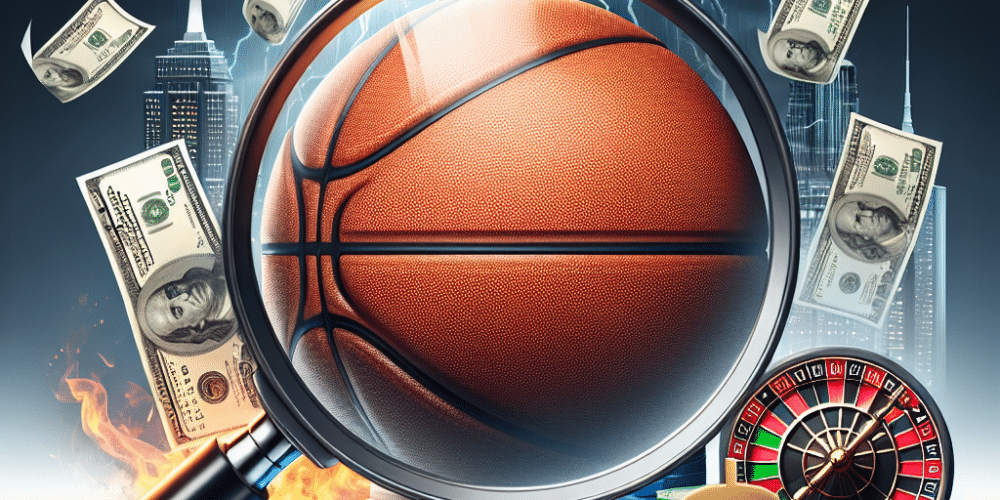The NBA, alongside its official sports betting partners like FanDuel and DraftKings, is intensifying its scrutiny on player prop bets following recent gambling scandals involving manipulation. The league has specifically identified certain types of wagers such as missed free throws, fouls, and turnovers as particularly susceptible to manipulation. As a preventive measure, the NBA requested sportsbooks not to offer bets on these events before the season commenced.
FanDuel, which has historically refrained from offering bets on these risky player stats, and DraftKings, which previously provided in-game free-throw wagers, have both agreed to the NBA’s request. DraftKings notably ceased offering these wagers before the current season began. The NBA, recognizing the potential for these bets to be exploited, is actively discussing with partners about setting appropriate limits on the most sensitive wagers. A spokesperson for the NBA emphasized that prop bets focusing on individual player performance demand increased vigilance due to their inherent integrity risks.
The recent scandals have drawn significant attention to player prop bets. The situation escalated when veteran guard Terry Rozier faced indictment for allegedly plotting with gamblers. Reports from federal authorities allege that Rozier informed a childhood friend of his plan to exit a March 2023 game prematurely due to a foot injury, which led to a hefty $100,000 in bets being placed based on this insider information. Rozier’s early exit after playing a mere nine minutes resulted in a flurry of under bets on his performance, summing up to $257,700 across various betting platforms.
While the NBA, in conjunction with reputable betting operators like FanDuel and DraftKings, appears to be managing the situation effectively, there remains a growing concern over the integrity of games. A DraftKings spokesperson noted that the recent events highlight the effectiveness of the regulated sports betting industry, which fosters collaboration among leagues, operators, regulators, law enforcement, and integrity monitoring services. FanDuel echoed similar sentiments, describing how its risk and trading teams are vigilant in monitoring games to identify and remove high-risk bets, particularly those involving players with two-way or 10-day contracts.
The NBA’s apprehension towards player props is not a newfound concern. Even before the current season, the league had advised sportsbooks against offering bets on players with two-way or 10-day contracts. This cautionary stance followed incidents like that of former Raptors center Jontay Porter, who was banned for game manipulation. Some bettors involved in Porter’s case have links to the recent Rozier scandal.
Player props have surged in popularity, especially as components of parlay bets. However, the NBA’s influence extends only to licensed sportsbooks operating under its jurisdiction. In contrast, daily fantasy operators, prediction markets, and offshore betting platforms continue to function with minimal oversight. Jeremy Kudon, president of the Sports Betting Alliance, warns that completely banning player prop bets might inadvertently drive more betting activities to unregulated platforms, thereby creating a “dangerous blind spot” for both leagues and regulators striving to maintain game integrity.
This warning underscores a critical dilemma faced by the NBA: how to effectively curtail the manipulation of betting markets without inadvertently driving bettors to unregulated spaces. This is particularly complex as player prop bets remain a lucrative and appealing market for many bettors, who enjoy the granular level of engagement these bets provide. The NBA, therefore, must balance its regulatory efforts to ensure they do not inadvertently harm the broader ecosystem it is trying to protect.
Another viewpoint suggests that rather than imposing outright bans, the NBA could consider reinforcing its partnerships with regulated sportsbooks to enhance monitoring and reporting mechanisms. By leveraging technology and data analytics, both the league and its betting partners could better detect suspicious betting patterns and intervene more swiftly to prevent potential manipulation.
In a market where sports betting continues to evolve rapidly, the NBA’s proactive stance serves as a reminder of the necessity for constant vigilance. Ensuring that the integrity of the game is upheld requires not just stringent oversight of betting activities but also an adaptable approach that can respond to emerging threats. The challenge lies in crafting regulations and operational practices that both protect the sport’s integrity and cater to the legitimate interests of the betting public.
As the dialogue between leagues, operators, and regulators continues, the NBA’s actions in fine-tuning its approach to player prop bets may well set a precedent for other sports leagues facing similar challenges. The objective remains clear: to maintain the excitement and engagement of sports betting while safeguarding the fairness and integrity that sports fans worldwide expect and deserve.

David Harrison stands tall in gambling journalism, marrying his firsthand casino experiences with a deep understanding of betting psychology. His articles transform complex gambling jargon into engaging tales of strategy and chance, making the world of betting accessible and enjoyable. David’s knack for narrative extends beyond print, making him a sought-after speaker on gambling trends and future bets. In the realm of gambling, David is both a scholar and a storyteller, captivating readers and listeners alike.
















